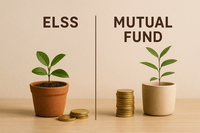What Is Financial Planning? Simple Guide to Its Meaning, Purpose & Process

What Is Financial Planning? Definition, Meaning, and Purpose
Financial planning is a process of looking at your money and creating a clear strategy for the future. It helps you determine how to allocate your funds best to achieve your objectives.
When people hear “financial planning,” they often think about money alone. But it is much more than that. It covers many parts of your life and money needs. It includes saving, spending, investing, taxes, retirement, insurance, and even planning for your family’s future.
This blog will explain what financial planning means, the purpose of financial planning, the financial planning process, the types of financial planning, and what a comprehensive financial plan looks like. By the end, you will understand why financial planning is important and how it can help everyone manage their money better.
What Is Financial Planning?
Financial planning is the process of creating a precise strategy for your money both now and in the future. It entails assessing how much money you have, how you spend it, how you save it, and what you want to do with it in the future.
It is not only about saving and investing. It entails devising strategies to prepare for a variety of events, such as crises, education expenditures, retirement, and unexpected bills. A strong financial plan strikes a balance in all of these areas, allowing you to live a happy life without financial worry.
A financial planner is someone who can assist you in creating this strategy. They look at your entire financial picture and help you create actions to achieve your objectives one by one.
Purpose of Financial Planning
The main purpose of financial planning is to help you use your money wisely. When you have clear goals, a plan keeps your money on track so you do not waste it or face surprises.
Here are some key purposes of financial planning:
-
To know where your money is going and control your spending.
-
To save money for important things like education, buying a home, or emergencies.
-
To prepare for retirement so you can stop working when you want but still have money to live well.
-
To reduce debt and manage loans in a smart way.
-
To protect your family with insurance and estate plans.
-
To grow your wealth by investing carefully based on your needs.
-
To pay less tax legally by planning your taxes well.
Without a plan, money can be spent without thought, saving can be missed, and future goals may seem too far or impossible. Financial planning turns that around with clear steps.
The Financial Planning Process
The financial planning process is a step-by-step way to create your money plan. It makes a big task simple and organized. Here are the main steps:
Understand Your Current Money Situation
The first stage is to assess your assets and liabilities. This is known as assessing your net worth. It entails totalling up your money, property, assets, and outstanding obligations or invoices. This provides a clear starting point.
Set Your Money Goals
Next, you state your goals. Goals might be short-term, like purchasing a new phone, or long-term, such as saving for education or retirement. Set specific and attainable goals. This helps you maintain attention.
Track Your Income and Spending
Take a look at the money that comes in and goes out each month. This is known as monitoring your cash flow. It may be difficult at first, but it will reveal areas where you may save money or spend less.
Make a Plan to Meet Your Goals
After determining where you are and where you want to go, you devise strategies to get there. This might include saving a certain amount each month, paying more to minimise loan debt, or investing your money. You also plan your budget.
Follow and Review Your Plan
A financial plan is not a one-time event. You must verify it on a frequent basis and update it if necessary. Life changes, such as a new job or a newborn, may necessitate updating your strategy.
Types of Financial Planning
Financial planning covers many areas. Each type focuses on a different part of your money life. They often work together to make the full plan. Here are eight common types of financial planning:
-
Tax Planning: Helps you pay the least tax possible by looking at your income, investments, and expenses.
-
Estate Planning: Prepares for what will happen to your money and belongings after you pass away. Includes wills and setting up trusts.
-
Retirement Planning: Makes sure you save enough to live comfortably after you stop working.
-
Philanthropic Planning: Plans how to give money to charity or causes you care about in a way that benefits you too.
-
Education Funding: Helps save money for school and college costs for your children or dependents.
-
Investment Planning: Guides you on where and how much to invest your money safely to grow it.
-
Insurance Planning: Checks what insurance you need to protect yourself and your family from big money losses.
-
Budgeting: Helps you spend wisely on daily needs and avoid debt.
Each of these types can be part of your overall financial planning process depending on your situation and goals.
What Is a Comprehensive Financial Plan?
A comprehensive financial plan covers all parts of your finances in one document. It shows your current situation, your goals, and all the steps you need to take.
It looks at:
-
Your income and expenses
-
Your debts and savings
-
Your investments and insurance
-
Plans for retirement, education, or estate
Having a comprehensive financial plan means you see your whole money picture clearly. This helps make better decisions and avoid missing anything important. It also helps you prepare for unexpected events so you stay on track.
Why Financial Planning Is Important for Everyone
Many people think financial planning is only for the rich or big businesses. But actually, everyone can benefit from good financial planning. It gives peace of mind and helps make smart choices with money.
For example:
-
Students can plan to pay for their education without too much debt.
-
Families can protect themselves with insurance.
-
Workers can prepare for retirement early.
-
Anyone can save for emergencies to avoid stress.
Without financial planning, money might run out, debts grow, or important goals might never happen. With financial planning, you bring control and confidence to your money life.
How to Start Your Financial Planning Journey
Starting your financial planning can be simple:
Write down what you own and what you owe.
Think about what you want for the next 1 year, 5 years, and 10 years.
Track your monthly income and spending.
Set a small saving goal and try to follow it.
Look for help from a financial planner if you want expert advice.





















